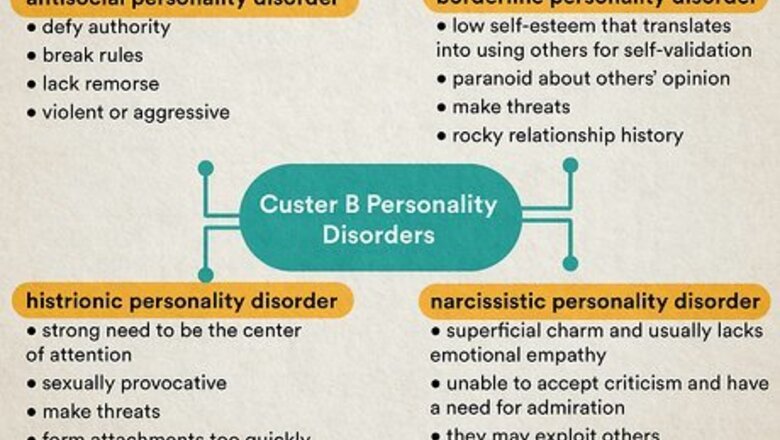
views
What exactly are Cluster B personality disorders?
People with Cluster B personality disorders are often dramatic, emotional, and unpredictable. Cluster B personality disorders include antisocial personality disorder, borderline personality disorder, histrionic personality disorder, and narcissistic personality disorder (more on these disorders below). While Cluster B personality disorders share some common characteristics, each disorder is unique and distinct.
Communicating with the Person
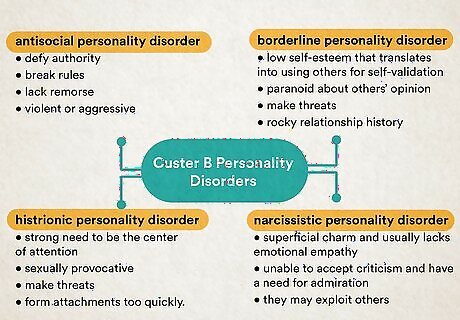
Recognize when Cluster B traits are at play. Personality disorders affect how someone manages their emotions and how they relate to others. These conditions are difficult, if not impossible, to overcome because they relate to the person's traits and personality. They're harder to treat than conditions like anxiety or PTSD, which are connected to a state of being rather than a trait. Knowing more about the person's tendencies can help guide your interactions with them. There are 4 personality types in Cluster B: A person with antisocial personality disorder may have thoughts and actions that defy those in authority. They may also break rules, lack remorse, and even be violent or aggressive. A person with borderline personality disorder has low self-esteem that translates into using others for self-validation. They may act paranoid about what others think, make threats, and have a rocky relationship history. A person with histrionic personality disorder feels a strong need to be the center of attention. They may act sexually provocative, make threats, and form attachments too quickly. A person with narcissistic personality disorder acts with superficial charm and usually lacks emotional empathy. This person may be unable to accept criticism and have a need for admiration. They may exploit others.

Listen actively to what the person says. Tuning in to what the person says helps ensure that the interaction will go more smoothly. If they feel ignored or pressured, they may act out. Make occasional eye contact and display open body language that doesn't seem as threatening or abrasive. Once they're finished talking, repeat what they said in a new way to be sure you heard it correctly.

Validate their feelings, even if you don't fully agree or understand. Validation can help affirm what the person is feeling, without necessarily agreeing with them. It can also prevent a tense situation from escalating. Here are some things you can say: "I'm sorry to hear you're going through that. It sounds stressful." "It sounds like you're feeling pretty lonely." "It's okay to be upset." "Of course you're stressed. You were in a very difficult situation there." "I'm here for you."

Set firm boundaries. Someone with a cluster B personality disorder may struggle with remembering to respect boundaries. They may sometimes act out or seek attention when it's not appropriate. You need to gently and firmly set boundaries to help them understand the expectations. If they don't stop, calmly tell them the consequences (such as you leaving the room) and follow through if needed. "Please don't call me after 8 at night. I use that time to relax with my family and get ready for bed. If you want, you can text me, and I'll see it the next day." "I understand you're upset. I am not okay with you yelling at me. If you don't stop, I will leave." "Please be gentle with my things. If you break them, then I won't let you borrow them anymore." "If you threaten me again, I will call the police."

Avoid trying to diagnose someone based on their behavior. If you suspect that they have a disorder, keep that suspicion private. People can only be diagnosed when they have consented to an evaluation from a trained provider. Never throw out labels like “histrionic” or “narcissistic" when talking to or about the person. Cluster B disorders can be stigmatized, sometimes unfairly. You could hurt the person's reputation and cause them to be ostracized. Some people with cluster B disorders prefer to keep their conditions private. You could really hurt their feelings if you share a correct suspicion.
Reacting to Inappropriate Behavior

Keep your cool when things get heated. People with cluster B disorders can face extreme mood swings that they may struggle to control. You can help by speaking calmly and putting on a calm face (even if you're stressed). Take a few deep breaths, ask for a timeout, or postpone the discussion for a later time. Keep in mind that if you remain grounded and calm, it's easier to de-escalate the situation. However, if you both lose your head, it'll be challenging to resolve the problem.

Try not to take hurtful words personally. People with cluster B disorders can experience strong mood swings, and they may say things that they don't mean in the heat of the moment. They behave this way because they don't have the social skills to know any better. Even when they don't mean it, it can still be hurtful. You're allowed to say "That hurts my feelings" or "I'm not okay with you talking to me that way." It's okay to walk away or take some space if you feel upset.
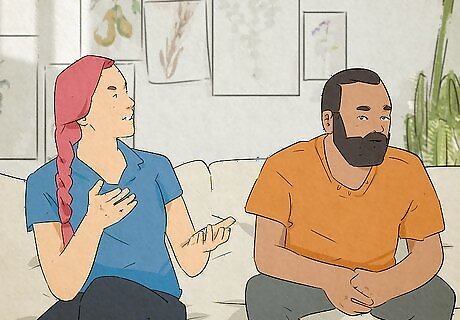
Avoid criticizing their behavior or minimizing their feelings. If the Cluster B person is already on edge, then criticism will only upset them even more. You might also avoid giving them suggestions or advice, which may “sound” like criticism to them. They need to feel understood, not ignored or controlled. Here are some examples of unhelpful things to say: "You're overreacting." "Calm down!" "It's not a big deal." "Just try _____." "Why are you so sensitive?" "Just get over it.
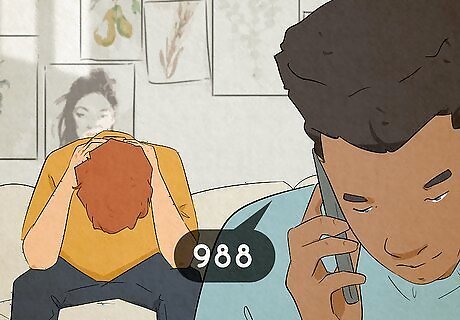
Call for help if they threaten suicide. Sometimes, a person with a cluster B disorder may say extreme things as a last-ditch attempt at getting their way. But other times, they really do feel suicidal, and they may be in danger of hurting themselves. Call a suicide hotline for assistance. If they're in the United States or Canada, call or text 988 to reach a suicide crisis helpline and let the person talk with a representative. This person can help "talk them down" and de-escalate the situation. If they use a suicide threat to try to get their way, say "I care about you and want you to be safe. That doesn't change my boundaries. If you really do feel suicidal, I can help you call a hotline or visit the emergency room."
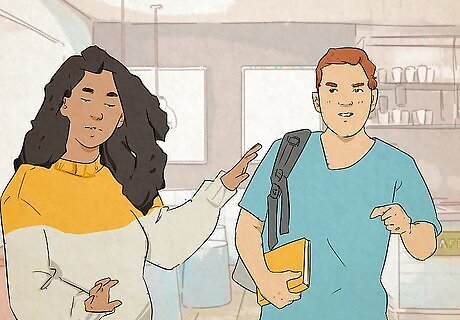
Walk away if you don't know how to handle things. While you may want to help make things better, it's unlikely to succeed if you don't know how. Leave if you feel scared or at your breaking point. Both of you can take time to calm down. Say "I need to be alone right now so I can calm down." If the person threatens to harm themselves or someone else, call local emergency services for help.
Caring for Yourself

Spend time with people who make you feel good. Strong friendships are important for everyone, and they're essential for people who have a difficult relationship with someone close to them. Build strong relationships with others who can offer you support and stability. Dedicate one day out of the week to fun activities with people who cheer you up. Make plans to do something like getting lunch or seeing a movie.
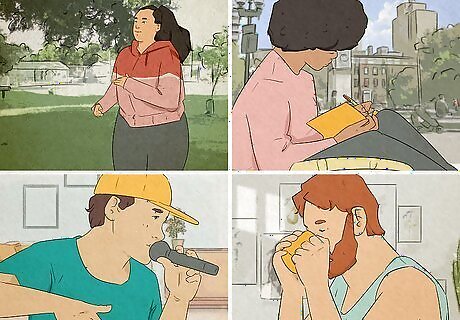
Practice self-care each day. Self care is important, and it's crucial for people who live with a cluster B loved one. By keeping yourself calm and balanced, you allow yourself to be better able to help them when they need it. Fifteen minutes of "me time" per day is the bare minimum. Try to get closer to an hour if you can. You could: Write in a journal Enjoy a warm drink Take a long walk with someone you love Massage yourself Take a hot shower Snuggle with a pet or person Laugh at a funny video Sing along to your favorite songs

Maintain your sense of self when you're interacting with them. While you may want to spend extra time on helping them, it's important to take time for yourself so that you don't lose your sense of who you are. Here are some ways to keep yourself centered: Write down your big priorities. Make sure you spend time on all of them. Write in a journal. Make time for your hobbies and favorite things. Remember that you can help them, but you can't control them. Don't blame yourself for being unable to fix everything.
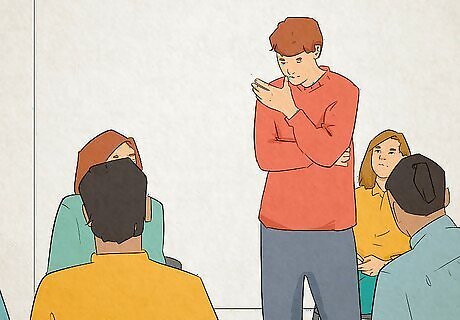
Participate in support groups. Meet with others who regularly interact with a Cluster B person through local support groups. Such groups can help you figure out strategies for dealing with the person and provide an outlet to vent your frustrations. Contact local mental health agencies to locate support groups in your area. You might also receive support virtually through online support groups.
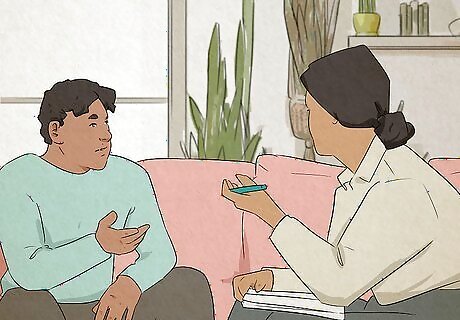
Talk to a counselor. A counselor can help you learn new ways to handle the cluster B person's behavior, and they can talk you through your own issues and frustrations. A counselor can serve as an excellent source of support. They can also help you develop coping strategies and learn how to set boundaries with the person. Look up counselors in your area who specifically have experience working with personality disorders. In some cases, the counselor may ask your friend or loved one to attend a session to improve communication between you. Only bring the person along if your counselor thinks it's a good idea.

Manage your expectations moving forward. The traits of people with personality disorders are pervasive and usually lifelong— they won't grow out of them. You'll need to adjust your own mindset to make interactions with this person more pleasant in the future. While people with personality disorders can learn new skills and improve their self-awareness, the disorders themselves aren't going to disappear. Learning about the disorder can help you better understand your loved one's thoughts and behavior.




















Comments
0 comment